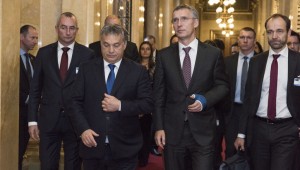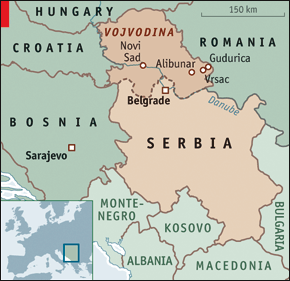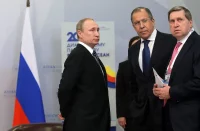(This posting is a select chapter from Andrew Korybko’s second book that will focus on the geopolitical application of Hybrid Wars.)
Victor Orban may not be a wolf in sheep’s clothing, but he’s definitely a fox. He sly presents himself as a populist voice that outspokenly represents emerging social norms, placing him at the vanguard of a changing Europe and endearing him with millions of fawning followers. There’s unquestionably a strong degree of institutional resistance from the established European powers to his raging popularity and iconic status, but by and large, this ‘old guard’ resistance to the ideals that Orban embodies only makes his popularity surge even more, and he’s quickly become an iconic and cult-like figure throughout Central and Eastern Europe, including the Balkans.
A fox is known for its cunningness, and this trait more than any other aptly describes the Hungarian Prime Minister. To many, Orban defines a new generation of ‘anti-systemic’ European leaders that are bravely defying the unipolar dictates of the US and the EU, but upon closer scrutiny, this is all but a carefully crafted sham (albeit with sincere convictions on Orban’s part) to ‘let the fox loose in the henhouse’ and undermine multipolar social movements before they ever have the chance to enact tangible change in Europe.
The Shifting EU Zeitgeist
It’s important for the reader to suitably comprehend the shifting social mood that’s been underway in Europe for at least the past couple of years. Maligned by the mainstream media as “Euroscepticism”, it could more accurately be described as “Euro-caution”, with many people all over the continent progressively becoming disenchanted with the anti-democratic dictates given to their countries by Brussels and behaving more reluctantly in following its commands. Whether it’s the Greek bailout packages or the current “refugee” crisis to name but two of most prominent examples, the EU’s actions have struck a raw nerve with a critical mass of people who no longer endorse the organization in its present form. The radical liberal-progressive ideology and rabid power moves of the past decade have finally caught up to its technocratic elite, and they’re having to unexpectedly (for them, at least) contend with rising conservative and pro-sovereignty resistance to their rule. The threat lies in the fact that this organic pan-continental social movement could become ‘uncontrollable’ and either lead to the EU’s dissolution (whether in full or in part) or indefinitely cripple its efficiency if a Euro-cautionary national leader decides to make things difficult and obstruct the organization’s functioning (the caveat being that the said individual mustn’t be co-opted by the US and acting under its strategic guidance, whether purposely or unwittingly).
The Two-Faced Fraud
Viktor Orban, however, took Euro-cautionary steps to cripple the EU when hefenced off the Hungarian border with Serbia and initiated a chain reaction of border buffering that unsettled the Balkan region. The more prominent aftershocks of this policy indirectly resulted in EU-leader Germany re-imposing temporary border restrictions with Austria and de-facto violating the very same principles that it had previously pledged to protect at all costs. Partially as a result of this and other actions, Orban has become the leader of the anti-“refugee” movement in Europe, taking the strongest and loudest stand of any EU member in questioning the intentions of these individuals, legally challenging Brussels’ quota resettlement scheme, and decrying the liberal-progressive ‘religion’ of ‘multiculturalism’ and ‘zero-borders’. In a sense, he’s positioned Hungary as the underdog in foiling Angela Merkel’s German-led vision of a liberal-progressive Europe, conservatively proposing a more sovereignty-centric approach to intra-union affairs and spearheading the way in leading by example. In general, Orban’s approach has enjoyed the full backing of his citizenry, as well as many other distressed Euro-cautionary individuals all across Central and Eastern Europe, turning him into the normative leader of the EU’s new nation-centric zeitgeist.

Enchanted by his fearless rebukes of Brussels and the strength of personality that he has in carrying out his populist decisions, Orban’s international supporters tend to overlook his less scrutinized role as a sleazy salesman for NATO expansionism. It was reported in early October that Hungary would host one of the bloc’s command centers, despite not sharing any border with Russia and thus invalidating the organization’s stated reasoning for such a facility. Looked at in a regional perspective, Romania and Bulgaria are doing the same thing, and the one point of commonality that they all share is that these countries border Serbia, one of the only European countries that’s not part of the grouping and is a key transit state for Balkan Stream and the Balkan Silk Road. Keep in mind that Hungary is supposed to be the terminal point for both projects, but alas, this doesn’t mean that Orban is immune from the temptation to project influence towards the country that he’ll one day become strategically dependent on if either project is ultimately completed.
In late November, Orban announced that he supports NATO membership for Macedonia, ‘justifying’ his position by saying that while Hungary wants “a unified economic and security zone, today there is a void between Hungary and Greece”, implying that it needs to be filled not just by the Macedonia, but also by Serbia. Granted, Hungary is in a much better position to influence the latter than it is the former, and it could potentially exert pressure on it by inciting ethnic disturbances in the demographically heterogeneous Autonomous Province of Vojvodina. Orban’s personal motivation wouldn’t be to disrupt the multipolar megaprojects that are expected to make his country the premier trade and energy hub of Central Europe, but to use this newfound position to expand Hungary’s influence over its neighbors and de-facto resurrect a new form of the Hungarian Empire (St. Steven’s Space, as it was referred to earlier). Of course, this neo-imperial vision can easily be used by the US as a carrot in goading Orban along into carrying out his majestic fantasy of national glory in order to facilitate the ‘unintentional’ obstruction of both projects, with the Hungarian leader being too blinded by the new nationalism that’s taken hold of his thinking (and that of Europe in general) to realize that he’s been tricked.
Around the same time that he was trying to impress Macedonian Prime Minister Gruevski with his fervent pro-NATO attitude, Orban also met with NATO Secretary General Jens Stoltenberg and received a congratulatory pat on the back for all that he has done in stepping up Hungary’s “collective security” commitment. What was being specifically addressed was how Orban increased the country’s defense budget (with the expectation that some of the new funds will be diverted to NATO) and ordered his country to participate in the anti-Russian Baltic “air-policing mission”. The NATO chief also thanked Orban for continuing to provide Hungarian troops to the bloc’s ongoing occupations of Afghanistan and the Serbian Province of Kosovo. Along the topic of NATO, Orban’s Foreign Minister attended the early-December summit in Brussels and helped brainstorm ideas for how the US-led military alliance could get more heavily involved in the Mideast against ISIL. Assessed from a neutral perspective unadulterated by the sway of Orban’s magnetic political personality and attractive advocacy of social conservatism, it’s objectively accurate to state that he’s one of the most pro-NATO leaders in the entire EU, and worse still, he’s also the only one that’s gained enough social ‘trust’ from the Central Balkan people to potentially mislead some of them down the path of formal American occupation.
Nationalist Pressures
It was earlier stated that Orban, led by his own desires, won’t intentionally do anything that would make the Balkan Stream and Balkan Silk Road projects unviable, believing that Hungary has too much to strategically lose than to foolishly play with fire for no tangible reason whatsoever. The problem arises when one becomes mindful of just how strong of an influence nationalist thought has on Orban and the rest of the population at the moment, and herein it’s necessary to draw a definitive difference with patriotism. Nationalism and patriotism are commonly (but improperly) used interchangeably by many people, unaware that although they might at times manifest themselves in similar ways, they are conceptually separate strands of thought. Nationalists tend to be more influenced by racial interests than state-based ones whether they’re cognizant of this reality or not, and in many of the cases where people blur the distinction between patriotism and nationalism (like in Hungary), the country in question has a strong degree of ethnic homogeneity. Patriotism differs from the previous by placing a stronger emphasis on the whole country’s interests, not just those of the titular majority, even if they come off as contravening the “racial interest” ardently supported by their nationalist counterparts.
A good example of this is in Russian Patriots supporting the authorities in the Muslim and autonomous Chechen Republic despite the majority of the Russian Federation being ethnic Russians and Orthodox Christian practitioners. A Russian Nationalist is absolutely opposed to any form of positive interaction with the non-Russian, non-Orthodox members of the country’s society, believing that individuals who don’t share these two demographic traits aren’t worthy of being part of Russia. Per this example, Russian Nationalists are thus predisposed to the racist slogans of American proxy Alexei Navalny to “stop feeding the Caucasus”, with the inference that Russia should ‘cut them off’ to become independent countries. This would lead to the voluntary Brzezinski-esque unravelling of the diverse Russian state and fulfill the US’ principle geopolitical objective for a fraction of the cost. Comparatively, a Russian Patriot has a vested interest in preserving Russia’s rich cultural, ethnic, and religious history and not in cutting the country apart based on identity lines, seeing his motherland’s diversity as a source of its civilizational strength.
 Returning back to Hungary after clarifying this important difference between concepts, it’s difficult at the moment to tell whether Orban is a nationalist or a patriot, since, as was mentioned, his country is one of those hard-to-discern types where the vast majority of the population is ethnically homogenous. The deciding factor in assessing which of the two ideologies he actually adheres to is in his government’s policies towards the Hungarian minority in Vojvodina, where they constitute around 13% of the population heavily concentrated near the border. At this time, Orban hasn’t taken any concrete moves in supporting that community’s “separateness” from the Serbian state, but the real test will come if the nationalist Jobbik Party happens to stir up ethnic discontent there and prompts a news-making provocation that he’s forced to respond to.
Returning back to Hungary after clarifying this important difference between concepts, it’s difficult at the moment to tell whether Orban is a nationalist or a patriot, since, as was mentioned, his country is one of those hard-to-discern types where the vast majority of the population is ethnically homogenous. The deciding factor in assessing which of the two ideologies he actually adheres to is in his government’s policies towards the Hungarian minority in Vojvodina, where they constitute around 13% of the population heavily concentrated near the border. At this time, Orban hasn’t taken any concrete moves in supporting that community’s “separateness” from the Serbian state, but the real test will come if the nationalist Jobbik Party happens to stir up ethnic discontent there and prompts a news-making provocation that he’s forced to respond to.
Should this happen, then the Hungarian Prime Minister would find himself in a political trap of his own making. He has already done so much to promote nationalism/patriotism (it’s not yet clear which one because of the blur between them due to Hungary’s demographic situation) that some citizens will surely be upset at him regardless of what he does because they too were confused over which ideology Orban had been peddling. The nationalists will be distraught to the point of potentially protesting against him if he doesn’t take strong and forceful anti-Serbian measures in response to a Jobbik provocation in Vojvodina, whereas patriots will be equally upset with him if he does, realizing that such a move would endanger Balkan Stream and the Balkan Silk Road. The very zeitgeist that Orban thought he had under his control could unwittingly prove to be his undoing if the nationalist opposition chooses to put him in the spot and force his hand one way or the other. Along the same train of thought, the US could indirectly influence Jobbik in this direction, knowing that their nationalist ideology makes them gullibly susceptible to being led along such a route.
The anti-government protests that could erupt in this scenario would be much more intense than the ones that preceded them in October 2014. At that time, NGOs organized thousands of people to march against him after the government levied a controversial internet tax, and John McCain even joined in the fray by maligning Orban as a “neo-fascist dictator”. While the fervor quickly died down after Budapest backtracked on the tax, the message that the protests sent was clear – the US is more than capable of stirring up Color Revolution unrest in Hungary if Orban doesn’t fall in line with its preferred policies. While he’s ‘behaving’ himself nice and well for the moment, if he ever does decide to ‘step out of line’ in a significant enough manner, the US could revive the Color Revolution threat against him, but by replacing the anti-tax protesters with much more aggressive and violent nationalists, provided of course that Orban falls deeper into the trap by refusing to go along with the anti-Serbian provocation scenario that’s set for him. Predictably, however, he’ll probably acquiesce to whatever he’s being guided to do, since the October 2014 Color Revolution scare seems to have made a significant enough of an impression on him that he’s now promoting NATO to the highest degree.
The Verdict
Orban pretends to be against ‘the system’, but in all actuality, he supports the US’ unipolar deigns in crafty and unexpected ways. His continental popularity stems mostly from being a vanguard of the evolving strategic paradigm for controlling post-“refugee” Europe, where nationalism/patriotism (again, the difference depends on domestic contexts and the individual leader practicing it) are becoming the order of the day. The US is turning away from using liberal-progressives as its agents of choice and is instead switching to nationalists and fake patriots, with the latter label being used to describe people who verbally espouse “patriotism” but actually practice nationalism. Orban falls under this category, since he’s deceptively gained much of Central and Eastern Europe’s trust through his conservative commentary and nationalist actions regarding the “refugee” crisis, but he’s a Trojan Horse in spreading normative support for NATO.
It’s too early to tell if he’ll voluntarily practice his nationalist-NATO policies towards Serbia or if he’ll have to be tricked into doing so by the US and/or Jobbik, but there’s a very real possibility that Hungary will one day activate its ethnic card in Vojvodina for whatever political ends it has in mind (be it to gain a one-up advantage on ‘upstream’ Serbia or to viciously destroy the multilateral Balkan Stream and Balkan Silk Road projects). For these reasons, while Orban might appear like a willingly enthusiastic multipolar partner in some respects (and he could very well be serious in his cooperative intent owing to the strategic-economic advantages that Hungary will predictably reap), he’s also an easily misled unipolar stooge in others, if not an outright agent of the US.














Pingback: Orban The Fox… | Protestation
Pingback: 2016 Trends and Geopolitical Forecast: Mega Analysis of Europe, Eurasia and the Middle East | Counter Information
Pingback: 2016 Trends And Geopolitical Forecast: Mega Analysis Of Europe, Eurasia, And The Middle East | FXandGeopolitix
Pingback: Polarized Poland: The Identity Crisis Goes International | Russian Institute for Strategic Studies
Pingback: Mega analysis: 2016 Trends Forecast by Andrew Korybko – GPOLIT